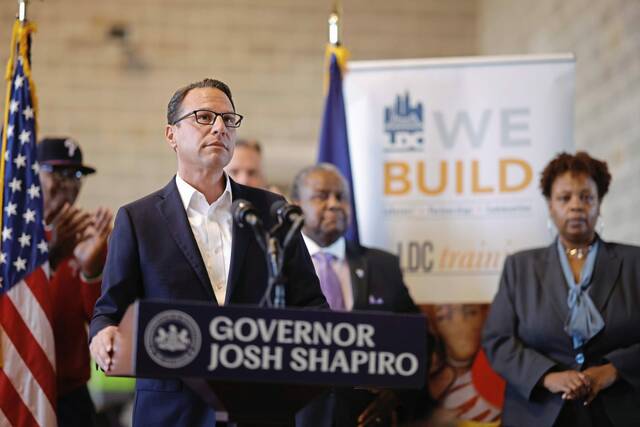Matt Smith, Darrin Kelly and Greg Bernarding: Seizing Western Pa.’s unique hydrogen opportunity
While proudly recognizing its industrial past — which helped to build our region and the modern world — Pittsburgh has emerged as a beacon of transformation primed to redefine America’s cleaner energy future.
Think about it: President Biden’s plan to tackle climate change demands swift economy-wide decarbonization, creating and preserving good-paying union jobs, and boosting resilience to ensure the energy transition delivers the improved economic and environmental conditions we all want to see for southwestern Pennsylvania. These are the exact challenges Pittsburghers were born to solve. We have done it before, and we are ready to do it again.
Hydrogen is widely recognized as the most effective way to reduce emissions from hard-to-abate sectors, especially from heavy industries like steel, transportation and cement manufacturing. Through the decades, Pittsburgh has worked hard to revitalize our region’s environment, and we are committed to continuing to reduce emissions from the industrial sector — meaning southwestern Pennsylvania represents both the need and the opportunity presented by the administration’s energy agenda.
Perhaps that’s why last fall, Pennsylvania became the only state to receive funding for two regional hydrogen hub networks to help build America’s hydrogen supply and scale technologies.
But the unique hydrogen opportunity available to our region will propel us beyond the foundational hub initiatives, catalyzing an ultra-low carbon intensity hydrogen economy now, and establishing southwestern Pennsylvania as the national leader in this next phase of the energy transition.
The key to realizing these benefits lies in strategic policy incentives that unlock the full potential of Pittsburgh’s transformation. Overly restrictive measures under the U.S. Treasury’s proposed 45V hydrogen production tax credit could make or break this region’s ability to lead the developing clean hydrogen market.
Southwestern Pennsylvania’s distinctive hydrogen opportunity includes an issue that is uniquely Appalachian — fugitive coal mine methane (CMM) emissions. CMM is a widespread problem accounting for roughly 10% of all U.S. methane emissions (emitting 51 million metric tons of methane annually) and contributing to nearly 13% of Pennsylvania’s industrial sector emissions. Coal mines continue to emit methane even if they’re inactive, and with no regulatory requirement or strong economic case for capturing fugitive CMM, regions like ours continue to suffer significant environmental consequences.
Without the full 45V hydrogen production tax credit, fugitive methane will continue to be emitted into the atmosphere and the viable hydrogen production paths won’t be available to the highly concentrated, hard-to-abate industries in the Appalachian region and beyond.
There is a solution, though, and one that can make western Pennsylvania the epicenter of the emerging hydrogen economy when turning harmful CMM emissions into a commodity. It solves the enormous decarbonization challenges our region faces while also improving our attractiveness for new investments and providing opportunities for job creation.
While other regions can claim their own unique opportunities on this front — from agricultural-based renewable natural gas in the nation’s breadbasket to wind and solar prevalent along the coastlines and the southwestern U.S. — CMM represents a key opportunity to develop a viable path to clean hydrogen at the scale necessary to decarbonize the region’s highly concentrated hard-to-abate industrial activity. Our business, labor and political leaders stand ready to do what is necessary to bring this unique hydrogen opportunity to fruition.
Like many former coal regions with legacy industrial activity, southwestern Pennsylvania continues to experience severe economic headwinds. If properly enabled and maximized, CMM-based hydrogen production will be able to create over 696,000 jobs in the Pittsburgh region over the next two decades and infuse over $213 billion into the regional economy.
We have identified over 30 unique projects, each with the potential to create close to 20,000 jobs.
These projects, however, can only happen with Treasury’s intentional recognition of the climate-positive impacts of methane abatement and the beneficial use of fugitive CMM.
If the end goal is to truly achieve meaningful emission reductions while boosting competitiveness and preserving good paying blue-collar jobs, we need policies that unlock this potential, not hinder it by dictating which feedstocks or projects qualify for funding and which don’t. We need an inclusive approach, consistent with the Inflation Reduction Act’s (IRA) technology-agnostic intent, that incentivizes cutting new and current emission sources.
Southwestern Pennsylvania exemplifies the extraordinary potential hydrogen can play in the environmental and economic future of industrial regions worldwide. We have aligned our resources, know-how and investments to partner on implementing the U.S. National Clean Hydrogen Strategy and Roadmap.
We urge the U.S. Treasury Department to finalize 45V hydrogen production tax credit regulations with the recognition and facilitation of the significant climate-positive impacts of fugitive methane’s beneficial use, thereby aligning with the original congressional intent and the Biden administration’s commitment to an inclusive energy transition.
This region is poised to lead on cleaning up fugitive methane emissions, creating a generational opportunity for new labor jobs, and catalyzing an ultra-low carbon intensity hydrogen economy now. This is a win across the board for the environment, the economy, and the citizens of our region — and it boosts the benefit of achieving exactly what the IRA’s tax credits were intended to do.
Matt Smith is chief growth officer at the Allegheny Conference on Community Development. Darrin Kelly is president of the Allegheny-Fayette Central Labor Council (AFL-CIO). Greg Bernarding is executive business manager of the Western Pennsylvania Building and Construction Trades Council.
Remove the ads from your TribLIVE reading experience but still support the journalists who create the content with TribLIVE Ad-Free.

